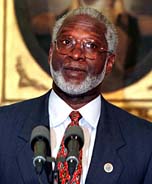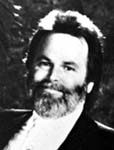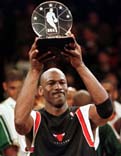Chance of Clinton's Removal Today: 16% | ||
| Feb. 13 | Former Secret Service officer retracts claim that he saw Clinton and Lewinsky alone together. Lewinsky lawyer William Ginsburg says client is "angry" at Starr | |

The Iraq crisis is fraying U.S.-Russian relations. 1) Last week, Russian President Boris Yeltsin said a U.S. attack on Iraq could trigger a world war. 2) The United States rejected a Russian-backed proposal to avert an attack by allowing limited U.N. weapons inspections. 3) The Washington Post reported that a document found in Iraq by U.N. inspectors indicated a Russian scheme to sell Iraq equipment that could help produce biological weapons. Russia denies any such deal. 4) Russia's defense minister warned that a U.S. attack on Iraq might endanger U.S.-Russian military cooperation (perhaps including arms control and dismantling Russian nukes). The New York Times speculated on Russia's motives: regaining stature in the Middle East, recovering the $7 billion Iraq owes for long-ago military sales, and retaliating against NATO's expansion into former Warsaw Pact territory. Best-case scenario: Russian leaders are just playing tough for domestic political consumption. Worst-case scenario: Yeltsin has gone nuts. (See "International Papers" for the global spin.) (2/13)

The Senate blocked a Republican bill to ban human cloning. Twelve Republicans voted with Democrats against considering the bill. Despite the requisite floor-debate references to Hitler, senators' early enthusiasm for a cloning ban was overwhelmed by their concern that the bill might thwart research that could help cure their pet diseases. The political scorecard: scientists and biotech companies 1, pro-lifers 0. The charitable spin, offered by the Los Angeles Times: Common sense overcame fear. The uncharitable spin: Fear of clumsy government overcame fear of mad scientists. (2/13)

Maine voters narrowly repealed their state law forbidding discrimination against gays. The New York Times called it "a landmark victory for Christian conservatives." Gay-rights advocates offered various excuses, saying that the Christian right was better organized (though gay-rights forces outspent them 5-to-1), that bad weather made campaigning difficult (though the weather on voting day was perfect), and that Maine is relatively conservative (though it isn't). The more plausible theory--that people tolerant of homosexuality don't think gays are sufficiently endangered to need legal protection--bodes ill for gays in other states. (2/13)


Canadian snowboarder Ross Rebagliati regained his gold medal after Olympics officials had disqualified him for flunking a drug test. Rebagliati's urine had registered a marijuana level just above the limit permitted by the world skiing federation, but this is less than 4 percent of the level that would be caused by smoking a single joint. Rebagliati's explanation: He had been at a party with friends who were smoking pot. (Washington Post writer Michael Wilbon called this a Reverse Clinton, i.e., "I only inhaled.") Sports officials sidestepped the factual issue and restored the medal on the grounds that the drug rules were unclear. Sports pundits pondered two questions: 1) Why should pot be forbidden, since it doesn't boost performance? 2) How can the Olympics incorporate hip new sports such as snowboarding, which are dominated by nonconformists who don't respect marijuana laws? Comics had fun with powder jokes, pot jokes (Rebagliati's national anthem: "Oh, Cannabis"), fake snowboarding events (the Super-J), and real ones (the halfpipe). (2/13)

Attorney General Janet Reno recommended appointment of an independent counsel to investigate Interior Secretary Bruce Babbitt. The investigation focuses on whether Babbitt lied to Congress about his role in the government's rejection of an Indian casino proposal. Scandal enthusiasts regret that Babbitt is the only Clinton official to get an independent counsel in the campaign-finance mess, but console themselves with the hope that the Babbitt probe will inevitably creep upward into the White House and the Democratic National Committee. Meanwhile, a Republican Senate report links Clinton supporters Mochtar and James Riady to a Chinese intelligence agency but fails to establish that China "funded, directed or encouraged" illegal donations to Democrats, or that such donations influenced any U.S. policies regarding China. (2/11)


The Senate confirmed David Satcher as U.S. surgeon general. Nineteen Republicans joined Democrats in voting for Satcher, defeating Sen. John Ashcroft, R-Mo., and other conservatives who had accused Satcher of condoning partial-birth abortions (Ashcroft called him "indifferent to infanticide"), free needles for junkies, and cruel experiments on HIV-infected African women. Editorialists relished Ashcroft's comeuppance and dismissed his campaign as cynical right-wing posturing for the 2000 Republican presidential primaries. The authorized spin on Satcher: He was born a poor black child and has become, in his own words, "an American dream come true." The unauthorized spin, from the Chicago Tribune: Has anyone noticed the absence of a surgeon general for the last three years? (2/11)


Titanic earned 14 Academy Award nominations, tying the record set in 1950. Film pundits called it the movie's final vindication in the face of early skepticism, noting its huge commercial success (it's already the fourth-highest-grossing film ever, and its soundtrack tops the U.S. music album charts). Some reviewers deemed this year's nominations a comeback for the big studios, which had lost out to independent films last year. This year's Cinderellas are The Full Monty (nominated for Best Picture) and The Sweet Hereafter (Best Director). Biggest surprise: no Best Picture or Best Director nomination for Steven Spielberg's Amistad. (2/11)

The Dow Jones industrial average topped 8,300 points and closed at its first record high in six months. This completes a 1,100-point comeback since the Dow's 550-point plunge in October. The consensus theory: The rally is investors' "sigh of relief" that the Asian crisis hasn't overwhelmed the U.S. economy. Analysts worry that the full effect of the Asian crisis hasn't yet been felt, that corporate-earnings projections have been cut nearly in half, and that the average price-to-earnings ratio is now 50 percent above normal. The New York Times rejoiced that Middle America is investing more and more of its assets in the market. Cynics concluded that the crash is coming and that once again, Middle America is climbing aboard just in time. (2/11)

Thousands of Afghans died in an earthquake and its aftershocks. Local officials claim that 15,000 homes have been destroyed and as many as 4,800 people have died, but international rescue workers put the casualty count at less than half that, arguing that "Afghan officials have exaggerated natural disasters in the past." U.S. newspapers were too busy with Monica Lewinsky and Iraq to pay much attention to the catastrophe. (2/9)


Beach Boys guitarist-singer Carl Wilson died of lung cancer at 51. The Los Angeles Times lauded his "sweet-sounding voice" and "stabilizing presence during the band's sometimes tumultuous history." The New York Times waxed nostalgic about the surf-rock world of "girls, cars, and an idealized California life of fun in the sun." Admirers proclaimed the Beach Boys "the nearest thing America has to the Beatles or the Rolling Stones." Cynics grimly agreed. (2/9)


Michael Jordan's East team defeated Kobe Bryant's West team in the National Basketball Association all-star game. The NBA hyped the game as Jordan vs. Bryant, Air vs. "Air Apparent," the greatest all-star of all time vs. the youngest, etc. Sportswriters rolled their eyes at the NBA's marketing campaign and rejoiced when Jordan met the challenge by coming back from a 102-degree fever to school Bryant, win the game, and take home the Most Valuable Player trophy. Basketball pundits are beginning to take Jordan at his word that this year will be his last unless his team, the Chicago Bulls, changes its coaching plans. They agree that Bryant might develop the Jordanesque talent and glamour to sustain the league, if the hype doesn't ruin him first. (2/9)
